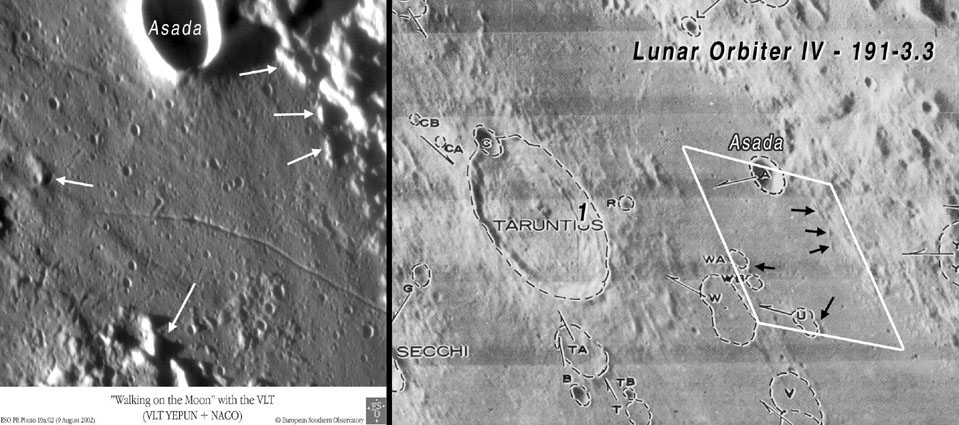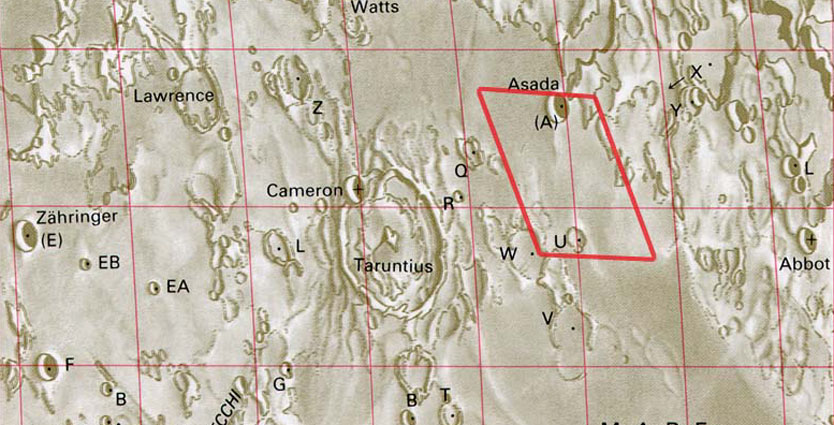Difference between revisions of "March 11, 2004"
(Created page with "__NOTOC__ =Where is Yesterday's LPOD?= ---- ===COMMENTS?=== Click on this icon image:PostIcon.jpg at the upper right to post a comment.") |
|||
| (10 intermediate revisions by the same user not shown) | |||
| Line 1: | Line 1: | ||
__NOTOC__ | __NOTOC__ | ||
=Where is Yesterday's LPOD?= | =Where is Yesterday's LPOD?= | ||
| − | + | <!-- Start of content --> | |
| − | + | <table width="640" border="0" align="center" cellpadding="6" cellspacing="2"> | |
| − | + | <tr> | |
| − | ---- | + | </tr> |
| − | === | + | </table> |
| − | + | <table width="85%" border="0" align="center" cellpadding="6" cellspacing="2"> | |
| + | <tr> | ||
| + | <td colspan="2"><div align="center"> | ||
| + | {{HoverImage|LPOD-2004-03-11.jpeg|LPOD-2004-03-11b.jpeg}}</div> | ||
| + | </td> | ||
| + | </tr> | ||
| + | </table> | ||
| + | <table width="100%" border="0" cellpadding="8"> | ||
| + | <tr> | ||
| + | <td><div align="center"><p>Image Credit: [mailto:rukl@planetarium.cz Tony Rukl]</p></div></td> | ||
| + | </tr> | ||
| + | </table> | ||
| + | <table class="story" border="0" bgcolor="#FFFFFF" width="90%" cellpadding="10" align="center"><tr><td> | ||
| + | <p class="story" align="center"><b>Where is Yesterday's LPOD? </b></p> | ||
| + | <p class="story" align="left"> | ||
| + | Yesterday's LPOD was the remarkably high resolution image of a small piece of the Moon taken two years ago with | ||
| + | one of the European Southern Observatory's 8.2 m telescope. Accepting the ESO press release, I stated that the | ||
| + | image showed an area just inside the crater Taruntius. ESO and I were wrong. Tony Rukl, the most acclaimed lunar | ||
| + | mapper alive, immediately emailed me that ESO had mis-identified the location. Tony sent the comparison image | ||
| + | above on which he has identified the crater Asada (formerly Taruntius A), which the ESO press release | ||
| + | mis-identified as Cameron (formerly Taruntius C). Tony also marked various ridges that appear on both the Orbiter | ||
| + | IV image and on the ESO one - there is no doubt, the ESO image shows an area 70-80 km east of where they thought! | ||
| + | Mouse-over the image to see a map version of the image location. This relocation solves a mystery that I puzzled | ||
| + | over in writing yesterday's LPOD - what was the source of the elongated crater chains in the southwest corner of | ||
| + | the ESO image? Now, with the new location, the explanation is simple - they are secondary craters from the | ||
| + | formation of Taruntius! This is an area of very poor Lunar Orbiter and Clementine imagery and would be an | ||
| + | excellent target for high resolution amateur webcam work! Thanks, Tony, for the correction! | ||
| + | </p> | ||
| + | <p class="story"><b>Related Links:</b><br> | ||
| + | [http://www.lpi.usra.edu/research/lunar_orbiter/bin/info.shtml?572 Lunar Orbiter IV - 191 image]<br> | ||
| + | [http://www.eso.org/outreach/press-rel/pr-2002/phot-19-02.html ESO Press Release] | ||
| + | </p> | ||
| + | <p><b>Yesterday's LPOD:</b> [[March 10, 2004|ESA Looks at Taruntius]] </p> | ||
| + | <p><b>Tomorrow's LPOD:</b> [[March 12, 2004|Forming the Moon]] </p> | ||
| + | </td></tr> | ||
| + | </table> | ||
| + | <!-- start bottom --> | ||
| + | <table width="100%" border="0" cellspacing="2" cellpadding="4"> | ||
| + | <tr> | ||
| + | <td><hr></td> | ||
| + | </tr> | ||
| + | <tr> | ||
| + | <td> | ||
| + | <p align="center" class="main_titles"><b>Author & Editor:</b><br> | ||
| + | [mailto:tychocrater@yahoo.com Charles A. Wood]</p> | ||
| + | <!-- Cleanup of credits --> | ||
| + | <!-- Cleanup of credits --> | ||
| + | <!-- Cleanup of credits --> | ||
| + | <!-- Cleanup of credits --> | ||
| + | <!-- Cleanup of credits --> | ||
| + | <!-- Cleanup of credits --> | ||
| + | <!-- Cleanup of credits --> | ||
| + | </tr> | ||
| + | </table> | ||
| + | <p> </p> | ||
| + | <!-- End of content --> | ||
| + | {{wiki/ArticleFooter}} | ||
Latest revision as of 18:13, 7 February 2015
Where is Yesterday's LPOD?
Image Credit: Tony Rukl |
|
Where is Yesterday's LPOD? Yesterday's LPOD was the remarkably high resolution image of a small piece of the Moon taken two years ago with one of the European Southern Observatory's 8.2 m telescope. Accepting the ESO press release, I stated that the image showed an area just inside the crater Taruntius. ESO and I were wrong. Tony Rukl, the most acclaimed lunar mapper alive, immediately emailed me that ESO had mis-identified the location. Tony sent the comparison image above on which he has identified the crater Asada (formerly Taruntius A), which the ESO press release mis-identified as Cameron (formerly Taruntius C). Tony also marked various ridges that appear on both the Orbiter IV image and on the ESO one - there is no doubt, the ESO image shows an area 70-80 km east of where they thought! Mouse-over the image to see a map version of the image location. This relocation solves a mystery that I puzzled over in writing yesterday's LPOD - what was the source of the elongated crater chains in the southwest corner of the ESO image? Now, with the new location, the explanation is simple - they are secondary craters from the formation of Taruntius! This is an area of very poor Lunar Orbiter and Clementine imagery and would be an excellent target for high resolution amateur webcam work! Thanks, Tony, for the correction! Related Links: Yesterday's LPOD: ESA Looks at Taruntius Tomorrow's LPOD: Forming the Moon |
|
Author & Editor: |
COMMENTS?
Register, Log in, and join in the comments.





